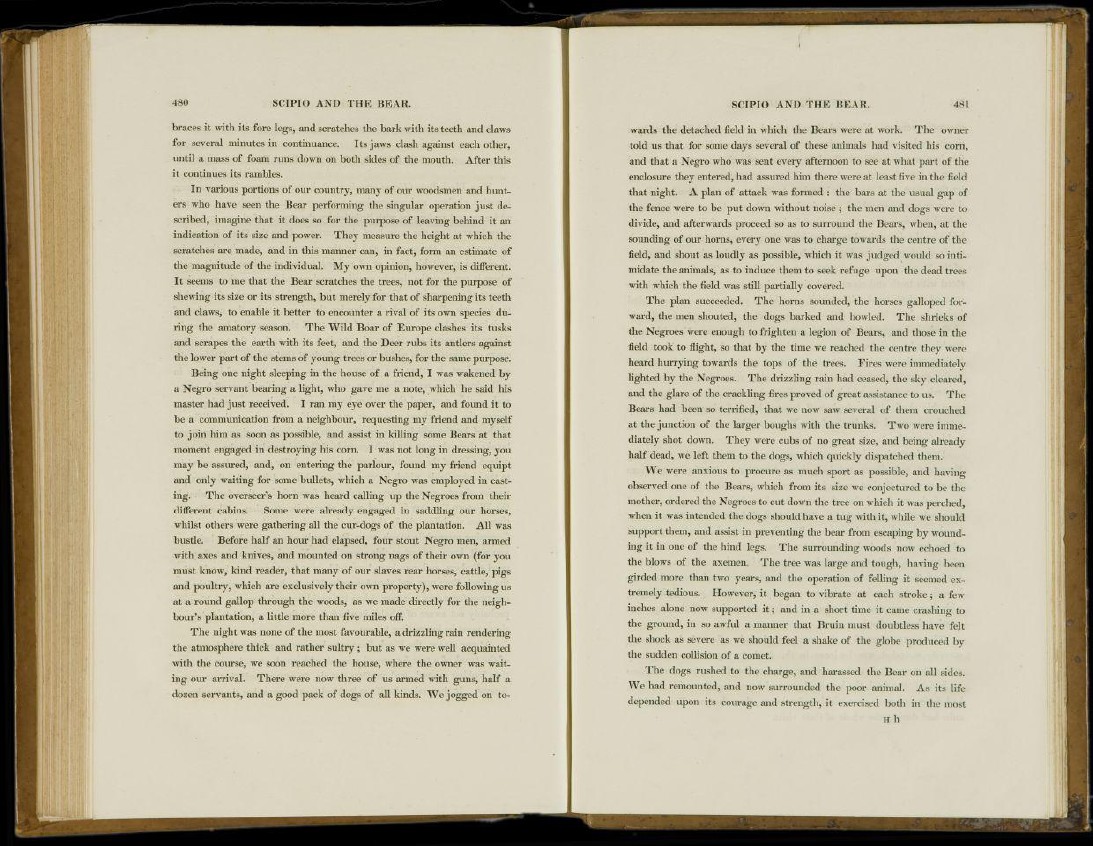
braces it with its fore legs, and scratches the bark with its teeth and claws
for several minutes in continuance. Its jaws clash against each other,
until a mass of foam runs down on both sides of the mouth. After this
it continues its rambles.
In various portions of our country, many of our woodsmen and hunters
who have seen the Bear performing the singular operation just described,
imagine that it does so for the purpose of leaving behind it an
indication of its size and power. They measure the height at which the
scratches are made, and in this manner can, in fact, form an estimate of
the magnitude of the individual. My own opinion, however, is different.
It seems to me that the Bear scratches the trees, not for the purpose of
shewing its size or its strength, but merely for that of sharpening its teeth
and claws, to enable it better to encounter a rival of its own species during
the amatory season. The Wild Boar of Europe clashes its tusks
and scrapes the earth with its feet, and the Deer rubs its antlers against
the lower part of the stems of young trees or bushes, for the same purpose.
Being one night sleeping in the house of a friend, I was wakened by
a Negro servant bearing a light, who gave me a note, which he said his
master had just received. I ran my eye over the paper, and found it to
be a communication from a neighbour, requesting my friend and myself
to join him as soon as possible, and assist in killing some Bears at that
moment engaged in destroying his corn. I was not long in dressing, you
may be assured, and, on entering the parlour, found my friend equipt
and only waiting for some bullets, which a Negro was employed in casting.
The overseer's horn was heard calling up the Negroes from their
different cabins. Some were already engaged in saddling our horses,
whilst others were gathering all the cur-dogs of the plantation. All was
bustle. Before half an hour had elapsed, four stout Negro men, armed
with axes and knives, and mounted on strong nags of their own (for you
must know, kind reader, that many of our slaves rear horses, cattle, pigs
and poultry, which are exclusively their own property), were following us
at a round gallop through the woods, as we made directly for the neighbour's
plantation, a little more than five miles off.
The night was none of the most favourable, a drizzling rain rendering
the atmosphere thick and rather sultry ; but as we were well acquainted
with the course, we soon reached the house, where the owner was waiting
our arrival. There were now three of us armed with guns, half a
dozen servants, and a good pack of dogs of all kinds. We jogged on towards
the detached field in which the Bears were at work. The owner
told us that for some days several of these animals had visited his corn,
and that a Negro who was sent every afternoon to see at what part of the
enclosure they entered, had assured him there were at least five in the field
that night. A plan of attack was formed : the bars at the usual gap of
the fence were to be put down without noise ; the men and dogs were to
divide, and afterwards proceed so as to surround the Bears, when, at the
sounding of our horns, every one was to charge towards the centre of the
field, and shout as loudly as possible, which it was judged would so intimidate
the animals, as to induce them to seek refuge upon the dead trees
with which the field was still partially covered.
The plan succeeded. The horns sounded, the horses galloped forward,
the men shouted, the dogs barked and howled. The shrieks of
the Negroes were enough to frighten a legion of Bears, and those in the
field took to flight, so that by the time we reached the centre they were
heard hurrying towards the tops of the trees. Fires were immediately
lighted by the Negroes. The drizzling rain had ceased, the sky cleared,
and the glare of the crackling fires proved of great assistance to us. The
Bears had been so terrified, that we now saw several of them crouched
at the junction of the larger boughs with the trunks. Two were immediately
shot down. They were cubs of no great size, and being already
half dead, we left them to the dogs, which quickly dispatched them.
We were anxious to procure as much sport as possible, and having
observed one of the Bears, which from its size we conjectured to be the
mother, ordered the Negroes to cut down the tree on which it was perched,
when it was intended the dogs should have a tug with it, while we should
support them, and assist in preventing the bear from escaping by wounding
it in one of the hind legs. The surrounding woods now echoed to
the blows of the axemen. The tree was large and tough, having been
girded more than two years, and the operation of felling it seemed extremely
tedious. However, it began to vibrate at each stroke; a few
inches alone now supported it; and in a short time it came crashing to
the ground, in so awful a manner that Bruin must doubtless have felt
the shock as severe as we should feel a shake of the globe produced by
the sudden collision of a comet.
The dogs rushed to the charge, and harassed the Bear on all sides.
We had remounted, and now surrounded the poor animal. As its life
depended upon its courage and strength, it exercised both in the most
H h